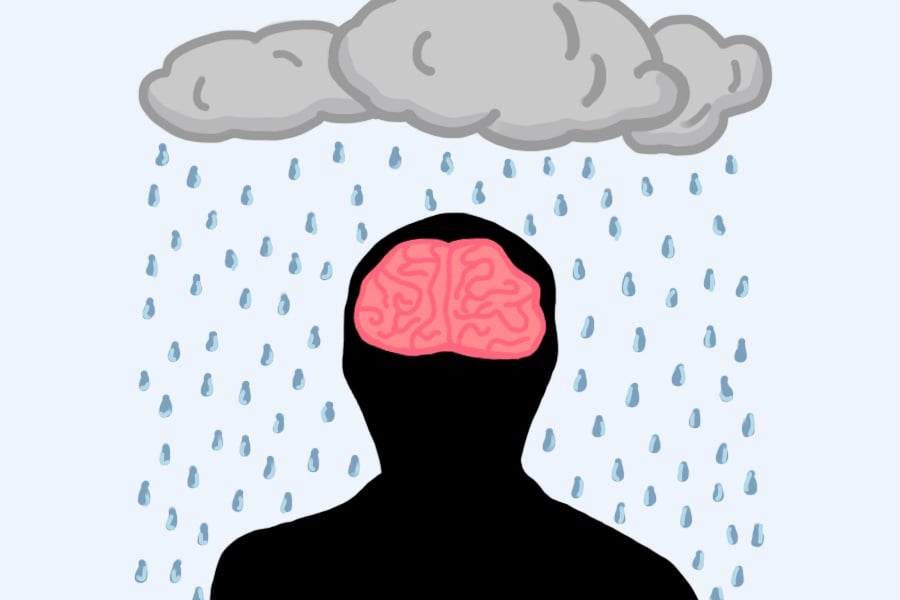As mental health needs rise, the city announces no new resources
File illustration by Emma Ruck
As academic stress increases, students struggle to maintain their mental health.
April 22, 2020
As Evanston residents seek mental health support at alarming rates, services face their own challenges with adapting to COVID-19, with local mental health experts expressing frustration with city inaction.
Aysha Hagene, owner of Simply Counseling, said the therapy center has received a 30 percent increase in calls and emails over the past month than in previous months. Mental Health America North Shore board president Josefina Alvarez said interest has spiked in their mental health discussions and education programs.
“Given how difficult it is to access mental health care, we probably aren’t going to be able to keep up with all the people that need services,” Alvarez said.
Alvarez said she hoped Mayor Steve Hagerty would offer city support at his “Coronavirus Q&A” on mental health last Monday. But Hagerty did not announce any new services or resources to address mental health concerns at the forum and instead discussed pre-existing hotlines and screenings. Alvarez said she worries city inaction will let suffering go untreated.
Sen. Laura Fine (D-Glenview), Rep. Robyn Gabel (D-Evanston) and Rep. Jennifer Gong-Gershowitz (D-Glenview) joined experts from the National Alliance on Mental Health for a similar Q&A on mental health Wednesday. Like Hagerty, the state leaders discussed coping strategies and pre-existing services, but did not mention any plans to introduce mental health legislation.
Alvarez said the uncertainty of the pandemic and nature of the stay-at-home order can affect mental health or worsen pre-existing conditions. The pandemic, for example, has triggered a rapid escalation in unemployment, and forced residents to deal with social isolation and abnormal routines.
“There are so many disruptions to mental health, and some people might not be able to bounce back,” Alvarez said.
To keep services running remotely, some Evanston counseling centers now offer teletherapy, where clients meet with a therapist via video conferencing.
Weinberg freshman Catherine Zhong tells her parents she has class when she heads to her bedroom for a video conference with her therapist. She said she has adapted to the routine of teletherapy, but she feels disappointed with the quality of virtual counseling.
“It almost makes it feel like it’s not real therapy,” Zhong said. “It was supposed to be my own journey, and now it doesn’t feel like that because I’m back home and because it’s through a screen.”
Zhong, who waited until college to seek therapy because her mom did not support the decision, said she couldn’t anticipate how hard it would be to find a safe space for therapy at home. Hagene said some of her clients also struggle to find secure spaces for counseling. One of her clients sits in her car to attend sessions privately.
Some therapists say they, too, are struggling with teletherapy.
“You’re looking at a computer screen, and you don’t have a lot of the nonverbal cues you would have if you were in person,” said Polina Reyngold, executive director and founder of Reyngold Psychotherapy and Wellness Center. “Your brain is overcompensating in a different way when you’re counseling virtually.”
Some residents can’t afford teletherapy, like those without healthcare. Simply Counseling is among a few local counseling centers that are offering options for sliding-scale prices on virtual therapy sessions, or providing free therapy with interns.
On April 11, the Illinois Department of Human Services also launched “Call for Calm,” a support line that residents can text to receive a free call from a mental health counselor within 24 hours.
During the phone call, counselors advise residents on local therapists but do not provide any therapy over the phone.
“(Counselors) will help you find someone to see long term,” Alvarez said. “The lines are not meant to be long term substitutes for therapy.”
Alvarez said she hopes the city will introduce resources to make quality mental healthcare more accessible to low-income households.
“Just like how we are providing info on how people can stay safe from the virus, we need to be doing the same for mental health,” Alvarez said.
Email: [email protected]
Twitter: @anika_mittu
Related Stories:
— Speak Your Mind: How NU students manage their stress amid COVID-19
— Alone, together: Addiction recovery organizations take community online
— Evanston, Chicago efforts at flattening the curve succeed, experts say


